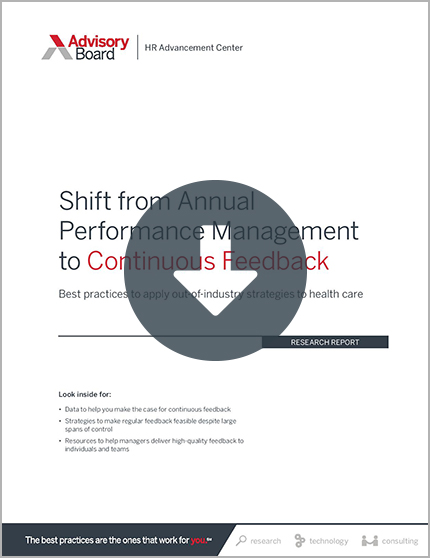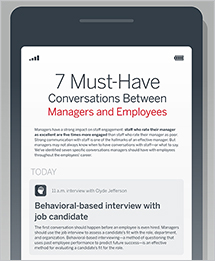Auto logout in seconds.
Continue LogoutEditor's note: This story was updated on May 31, 2018.
Writing in the Harvard Business Review, Deborah Grayson Riegel offers a few simple steps on how leaders can respond to workers who are not open to criticism.
Grayson Riegel, a leadership coach, notes that no matter how committed you are to providing actionable feedback, improving performance is a two-way street: Your team members need to be receptive and responsive.
But oftentimes, those on the receiving end of constructive comments get defensive, shut down, act out, or otherwise simply refuse to change their ways.
When that happens, Grayson Riegel says leaders should take a step back from talking to their direct report about overall job performance, and instead "start giving feedback on how the employee receives feedback."
Grayson Riegel shares five keys to making that conversation a success.
1. Explain why it matters. Your employee "may not be aware that part of his [or her] job is to receive your feedback seriously and professionally," Grayson Riegel notes. She suggests detailing how your employee's resistance affects his or her career trajectory and reputation, as well as the organization overall.
2. Throw out assumptions. You shouldn't assume that your employee sees himself or herself as being resistant to feedback, Grayson Riegel says. She suggestions asking questions to better assess where the worker is coming from.
Relatedly, Grayson Riegel stresses the importance of not using language that implies blame or assumes why an employee is acting in a certain way. For instance, rather than telling an employee that you notice he or she "won't make eye contact" when receiving feedback, Grayson Riegel suggests saying, "When I give you feedback, I notice that you look at the floor. I'm curious to know what's going on for you."
3. Solicit feedback for yourself. Many managers may be unaware of their own communication challenges, like sending mixed messages or weighing in with comments at inopportune times. By asking for feedback on how you can improve, Grayson Riegel says you can bring some of those issues to the surface while also modeling how to best receive feedback for your employee.
4. Share a story of your growth. According to Grayson Riegel, it also helps to tell your employee about a time when you struggled with receiving feedback, and what you learned from the situation.
5. Set a goal. You should ask for a specific way your employee should change his or her behavior when receiving feedback, and—after hearing those concerns—agree on a goal, Grayson Riegel says.
And after you hold your meeting about feedback, Grayson Riegel stresses the importance of looking for evidence that your employee's behavior has improved—and celebrating that improvement.
"Speak up the very first time you notice him [or her] acting differently," she says (Grayson Riegel, Harvard Business Review, 11/6).
7 must-have conversations between managers and employees
Strong communication with staff is one of the hallmarks of an excellent manager. But communication can be an abstract concept, so we've identified seven specific conversations managers should have with employees throughout employees' careers.
Don't miss out on the latest Advisory Board insights
Create your free account to access 1 resource, including the latest research and webinars.
Want access without creating an account?
You have 1 free members-only resource remaining this month.
1 free members-only resources remaining
1 free members-only resources remaining
You've reached your limit of free insights
Become a member to access all of Advisory Board's resources, events, and experts
Never miss out on the latest innovative health care content tailored to you.
Benefits include:
You've reached your limit of free insights
Become a member to access all of Advisory Board's resources, events, and experts
Never miss out on the latest innovative health care content tailored to you.
Benefits include:
This content is available through your Curated Research partnership with Advisory Board. Click on ‘view this resource’ to read the full piece
Email ask@advisory.com to learn more
Click on ‘Become a Member’ to learn about the benefits of a Full-Access partnership with Advisory Board
Never miss out on the latest innovative health care content tailored to you.
Benefits Include:
This is for members only. Learn more.
Click on ‘Become a Member’ to learn about the benefits of a Full-Access partnership with Advisory Board
Never miss out on the latest innovative health care content tailored to you.


